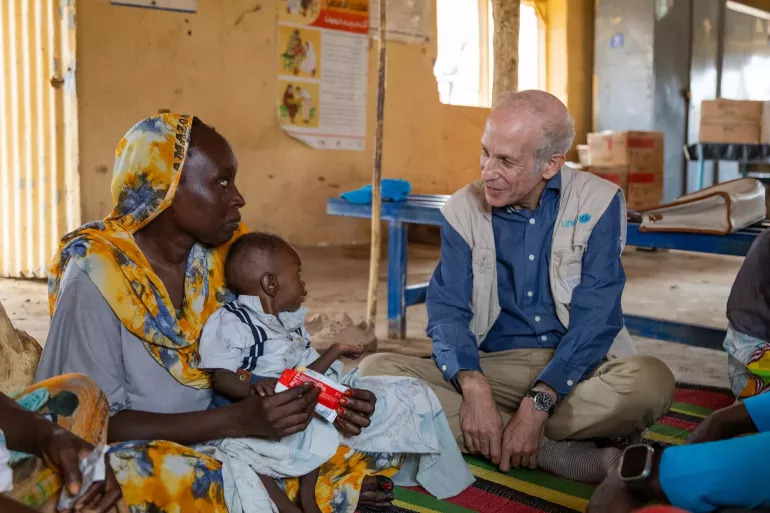A deepening funding crisis and ongoing conflict in Sudan are pushing an entire generation of children to the edge of irreversible harm, the United Nations Children’s Fund (UNICEF) warned on Tuesday. With international support drying up and humanitarian access severely constrained, the situation is rapidly deteriorating for millions across the war-torn country.
Cuts to foreign aid from major donors, including the United States, have left the UN refugee agency (UNHCR) and other humanitarian bodies grappling with one of the most severe financial shortfalls in decades. The impact is being felt most acutely by children, with escalating rates of malnutrition and limited access to water, food, and healthcare.
“Children have limited access to safe water, food, and healthcare. Malnutrition is rife, and many good children are reduced to just skin, bones,” said Sheldon Yett, UNICEF’s Representative in Sudan, during a video briefing from Port Sudan.
The armed conflict between Sudan’s military and the Rapid Support Forces (RSF) has devastated the country since it broke out over 800 days ago. The fighting has fractured Sudan into competing zones of control and displaced millions. The RSF remains entrenched in the west, particularly in Darfur, where the humanitarian toll is spiraling.
UNICEF reports that the ongoing hostilities are isolating vulnerable populations from life-saving assistance.
“With recent funding cuts, many of our partners in Khartoum and elsewhere have been forced to scale back… We are being stretched to the limit across Sudan, with children dying of hunger. We [are] on the verge of irreversible damage being done to an entire generation of children in Sudan.”
Sheldon Yett

Sudan Conflict, Hunger Push Families Into Peril
The World Food Programme (WFP) had already sounded alarms in July, warning that famine looms in areas south of the capital, Khartoum. Yet, just 23% of the $4.16 billion required for Sudan’s humanitarian response has been secured, according to the UN Office for the Coordination of Humanitarian Affairs (OCHA).
Access remains a formidable barrier. Seasonal floods have rendered key roads impassable, while areas such as Al-Fashir remain under siege. “It has been one year since famine was confirmed in ZamZam camp, and no food has reached this area. Al-Fashir remains under siege. We need that access now,” said Jens Laerke, spokesperson for OCHA.
El Fasher, the capital of North Darfur, witnessed renewed fighting on August 1 and 2, resulting in significant civilian casualties. Earlier clashes near the Abu Shouk camp – home to 25,000 displaced people – further highlighted the peril faced by those uprooted by war.
Health emergencies are compounding the crisis. Cholera is spreading rapidly, with nearly 1,200 cases – around 300 of them children – reported in Tawila since June. In South Darfur, over 1,100 suspected cholera cases and 64 deaths have been recorded since May. UN officials say “shortages of medical supplies, clean water, and sanitation services are severely hampering the humanitarian response.”
UNICEF estimates that over 640,000 children under five are at risk of starvation, illness, and violence in Darfur alone.
The suffering is not confined to one region. In Blue Nile State, flooding in Ed Damazine on August 1 displaced over 100 people and destroyed 200 tents in Al-Karama camp. Meanwhile, landmines in Khartoum State continue to pose daily threats to civilians already struggling to survive.
OCHA’s Director of Operations, Edem Wosornu, is visiting Sudan this week to assess conditions and reiterate the urgent need for expanded access and international backing. The agency is calling on donor countries to step up support and prevent the collapse of humanitarian operations in what has become the world’s largest crisis.
READ ALSO: Australia Fears a Vanishing Palestine as Gaza, West Bank Suffer























